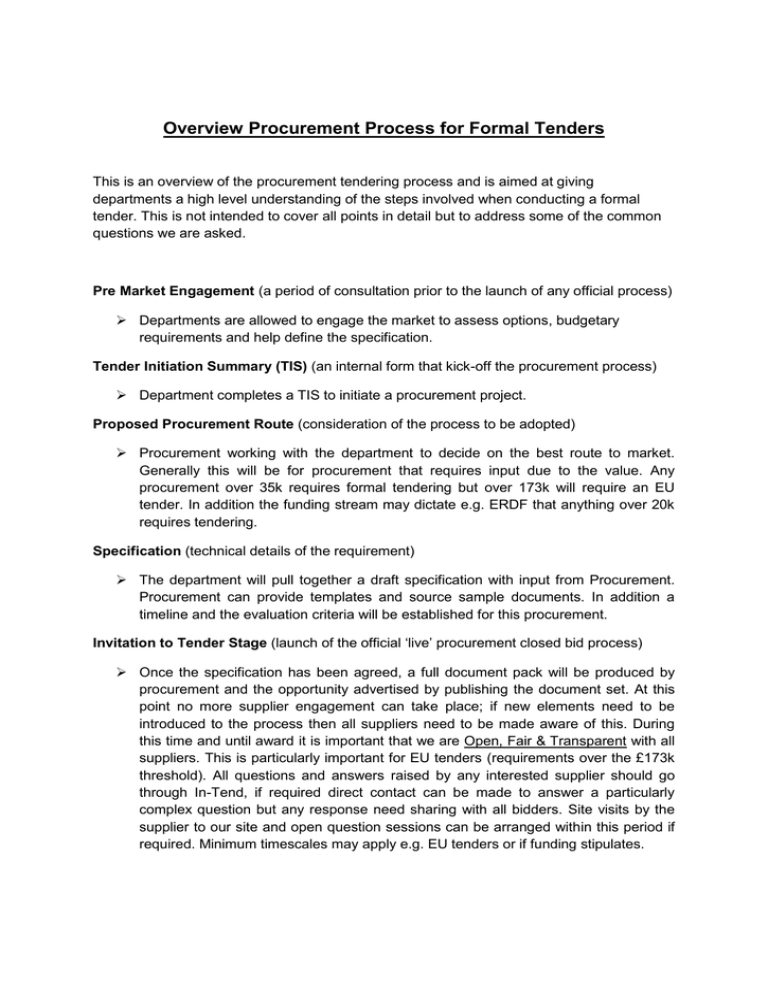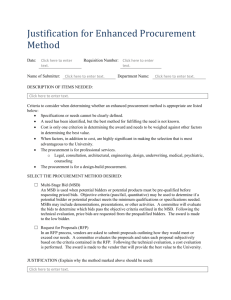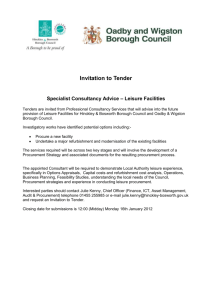Overview Procurement Process for Formal Tenders
advertisement

Overview Procurement Process for Formal Tenders This is an overview of the procurement tendering process and is aimed at giving departments a high level understanding of the steps involved when conducting a formal tender. This is not intended to cover all points in detail but to address some of the common questions we are asked. Pre Market Engagement (a period of consultation prior to the launch of any official process) Departments are allowed to engage the market to assess options, budgetary requirements and help define the specification. Tender Initiation Summary (TIS) (an internal form that kick-off the procurement process) Department completes a TIS to initiate a procurement project. Proposed Procurement Route (consideration of the process to be adopted) Procurement working with the department to decide on the best route to market. Generally this will be for procurement that requires input due to the value. Any procurement over 35k requires formal tendering but over 173k will require an EU tender. In addition the funding stream may dictate e.g. ERDF that anything over 20k requires tendering. Specification (technical details of the requirement) The department will pull together a draft specification with input from Procurement. Procurement can provide templates and source sample documents. In addition a timeline and the evaluation criteria will be established for this procurement. Invitation to Tender Stage (launch of the official ‘live’ procurement closed bid process) Once the specification has been agreed, a full document pack will be produced by procurement and the opportunity advertised by publishing the document set. At this point no more supplier engagement can take place; if new elements need to be introduced to the process then all suppliers need to be made aware of this. During this time and until award it is important that we are Open, Fair & Transparent with all suppliers. This is particularly important for EU tenders (requirements over the £173k threshold). All questions and answers raised by any interested supplier should go through In-Tend, if required direct contact can be made to answer a particularly complex question but any response need sharing with all bidders. Site visits by the supplier to our site and open question sessions can be arranged within this period if required. Minimum timescales may apply e.g. EU tenders or if funding stipulates. Closing date (the date when the suppliers submit bids) Once the tender has closed, no new information can be added to the process. Whilst we can’t negotiate at this point we can clarify bids, which can sometimes be a very fine line and something that must be managed by procurement. This is where we must follow the rules that we have set out in the tender. Site visits to the supplier or nominated reference points can take place at this time, along with presentations to help clarify our understanding of bids. Throughout this period evaluation of the bids will take place. In parallel to this procurement will be performing the relevant due diligence checks such as checking for insurance, financials, etc. Intention to Award (the point at which we have a preferred supplier position) Once we are happy with our understanding of bids we can then score the submissions and award to the highest scoring bidder; scoring usually follows the mantra of “MEAT” (Most Economically Advantageous Tender) and not the lowest cost. At award for EU tenders a ten day standstill period must be applied (10 day cooling-off period to allow unsuccessful suppliers to question our decision). The University apply this method of award and standstill as best practice for all tenders. It is at this point that we are entitled to negotiate with the supplier that had achieved the preferred status position. Award (final decision resulting in confirmation and purchase order) Once ten days have passed (if applicable) and final negotiations have concluded. A final award letter is sent and followed by an official purchase order. Link to an overview of the procurement process in FP15 http://www2.warwick.ac.uk/services/finance/resources/regulations/fp15/fp15.28_process_ov erview.pdf Any questions in relation to this document or with Procurement in general please contact: purchasing@warwick.ac.uk








